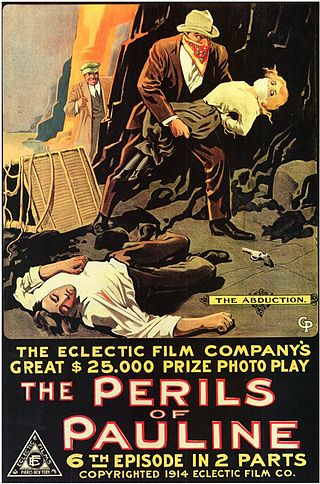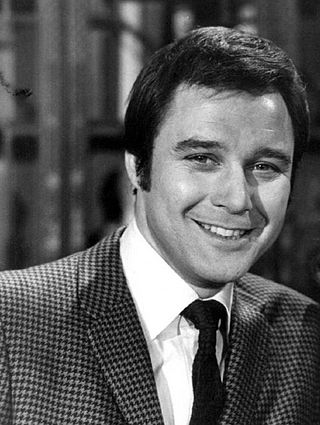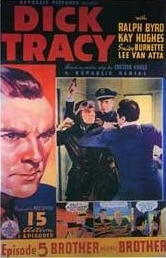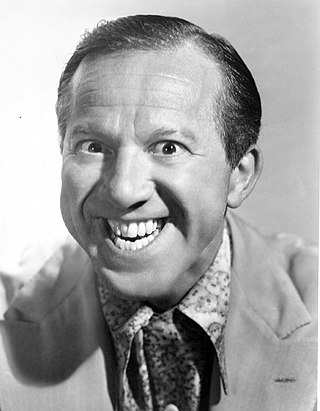
A cliffhanger or cliffhanger ending is a plot device in fiction which features a main character in a precarious situation, facing a difficult dilemma or confronted with a shocking revelation at the end of an episode of serialized fiction or before a commercial break in a television programme. A cliffhanger is intended to incentivize the audience to return to see how the characters resolve the dilemma.
Columbia Pictures Industries, Inc., commonly known as Columbia Pictures, is an American film production and distribution company that is the flagship unit of the Sony Pictures Motion Picture Group, a division of Sony Entertainment's Sony Pictures, which is one of the "Big Five" film studios and a subsidiary of the multinational conglomerate Sony Group Corporation.

Bernard Shalom Kotzin, known as Stubby Kaye, was an American actor, comedian, vaudevillian and singer, known for his appearances on Broadway and in film musicals.

42nd Street is a 1933 American pre-Code musical film directed by Lloyd Bacon, with songs by Harry Warren (music) and Al Dubin (lyrics). The film's numbers were staged and choreographed by Busby Berkeley. It stars an ensemble cast of Warner Baxter, Bebe Daniels, George Brent, Ruby Keeler, Dick Powell and Ginger Rogers.

Ivan Lawrence Blieden, known professionally as Larry Blyden, was an American actor, stage producer and director, and game show host. He made his Broadway stage debut in 1948 and went on to appear in numerous productions on and off Broadway. In 1972, he won the Tony Award for Best Featured Actor in a Musical for his performance in the revival of A Funny Thing Happened on the Way to the Forum which he also produced. That same year, he became the host of the syndicated revival version of What's My Line?

James Wesley Horne was an American actor, screenwriter, and film director.

Educational Pictures, also known as Educational Film Exchanges, Inc. or Educational Films Corporation of America, was an American film production and film distribution company founded in 1916 by Earle Hammons (1882–1962). Educational primarily distributed short subjects; it is best known for its series of comedies starring Buster Keaton and the earliest screen appearances of Shirley Temple (1932–34). The company ceased production in 1938, and finally closed in 1940 when its film library was sold at auction.
Heatter-Quigley Productions was an American television production company that was launched in 1960 by two former television writers, Merrill Heatter and Bob Quigley. After Quigley's retirement, the company became Merrill Heatter Productions.

Screen Gems is an American film production company owned by Sony Pictures Entertainment, a subsidiary of Japanese multinational conglomerate, Sony Group Corporation. The Screen Gems brand has served several different purposes for its parent companies over the decades since its incorporation, initially as a cartoon studio, then a television studio, and later on as a film studio. The label currently serves as a film production that specializes in genre films, mainly horror.

Michael Callan, sometimes known as Mickey Collins, was an American actor best known for originating the role of Riff in West Side Story on Broadway, and for his film roles for Columbia Pictures, notably Gidget Goes Hawaiian, The Interns and Cat Ballou.

Dick Tracy (1937) is a 15-chapter Republic movie serial starring Ralph Byrd based on the Dick Tracy comic strip by Chester Gould. It was directed by Alan James and Ray Taylor.

The Spider's Web is a 1938 Columbia Pictures movie serial based on the popular pulp magazine character The Spider. It was the fifth of the 57 serials released by Columbia.

The Spider Returns is a 1941 15-chapter Columbia movie serial based on the pulp magazine character The Spider. It was the fourteenth of the 57 serials released by Columbia and a sequel to their 1938 serial The Spider's Web. The first episode runs 32 minutes, while the other 14 are approximately 17 minutes each.

The Shadow (1940) was the ninth serial released by Columbia Pictures. It was based upon the classic radio series and pulp magazine superhero character of the same name.

Charles Knox Manning was an American film actor. He was born in Worcester, Massachusetts and died in Woodland Hills, Los Angeles, California. He and Annette North Manning are interred at Ivy Lawn Cemetery in Ventura, California.

James Craven was a Canadian-American actor. He played a wide variety of roles and has a minimum of 98 film and television credits including the TV show The Adventures of Kit Carson, as well as the classic motion picture Johnny Belinda and the popular movie serials The Green Archer, Captain Midnight, and King of the Rocket Men.

Jerry Lester was an American comedian, singer and performer on radio, television and the stage, known for playing the father of the main characters, Mike Firpo, in the comedy Odds and Evens and who hosted the first network late night television program as host of Broadway Open House on NBC, a vaudeville-esque combination of comedy and music, whose success demonstrated the potential for late-night television and led to the creation of the Tonight Show.

A serial film,film serial, movie serial, or chapter play, is a motion picture form popular during the first half of the 20th century, consisting of a series of short subjects exhibited in consecutive order at one theater, generally advancing weekly, until the series is completed. Usually, each serial involves a single set of characters, protagonistic and antagonistic, involved in a single story, which has been edited into chapters after the fashion of serial fiction and the episodes cannot be shown out of order or as a single or a random collection of short subjects.
Henry Clay Warnick, Jr., also known as Buck Warnick, Clay Warnick, and H. Clay Warnick, was an American composer, arranger, lyricist, conductor, and musical director. He had an active career on Broadway from 1942 through 1963, and was also a prolific composer of jingles for advertisements on radio and television with the Young and Rubicam agency. From 1950 to 1954 he was the music director of the television program Your Show of Shows.

Sylvia Froos, sometimes spelled as Sylvia Fross, was an American actress and singer who appeared on stage, radio, recordings, television, and film during the 1920s through the 1940s. She was a child star that was sometimes billed as Baby Sylvia and as the "Little Princess of Song" and in the UK as "America's Queen of Song". She was also referred to as "The Miniature Belle Baker", with her ability to mimic the vocal performances of celebrities being particularly noted by the media, and was additionally likened to Sophie Tucker and Marion Harris.

















